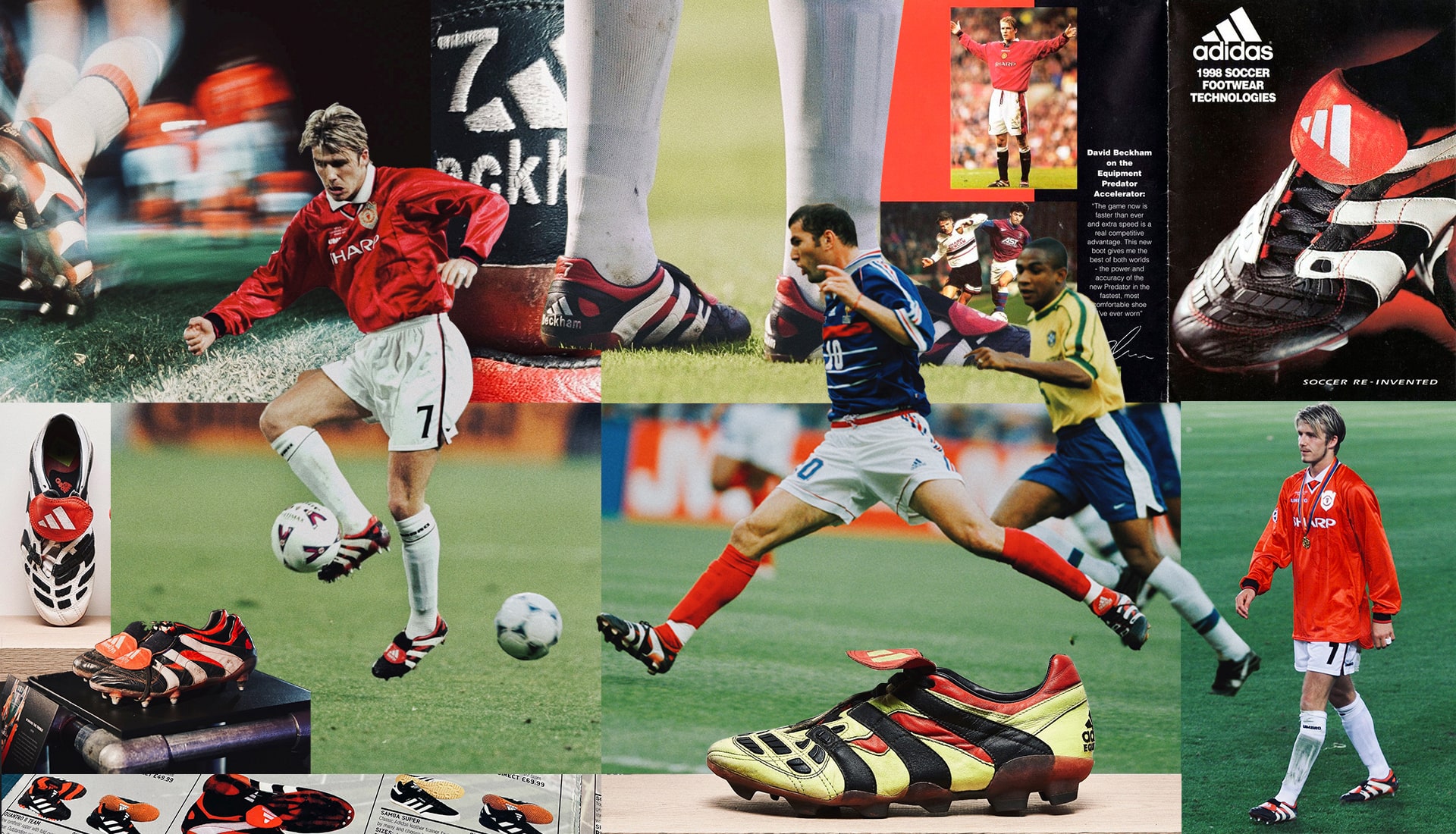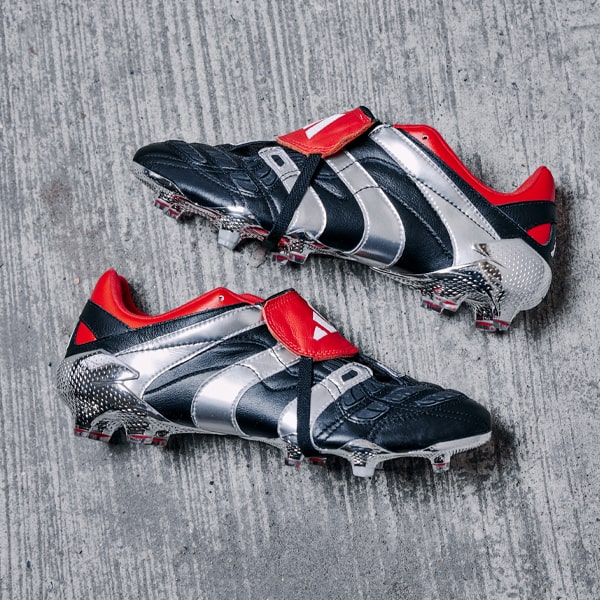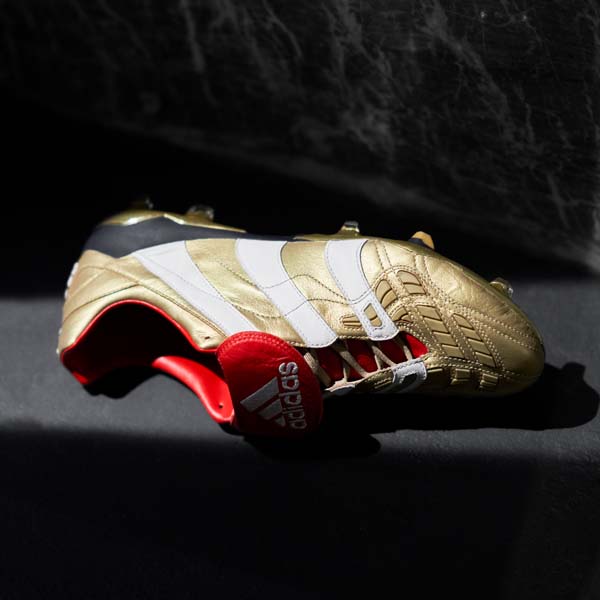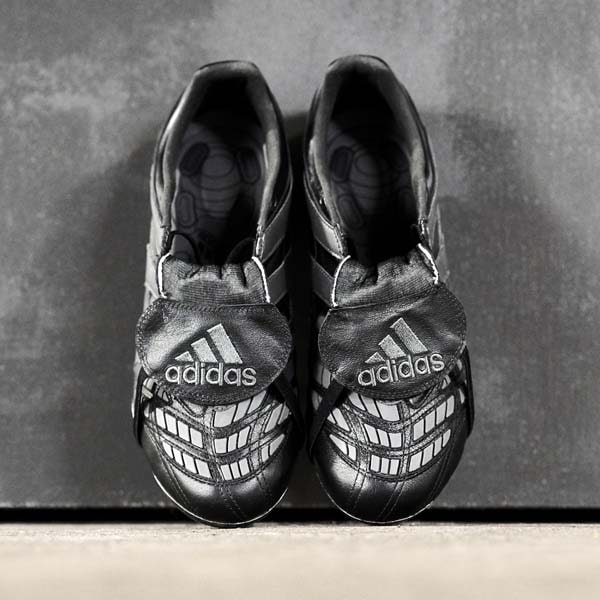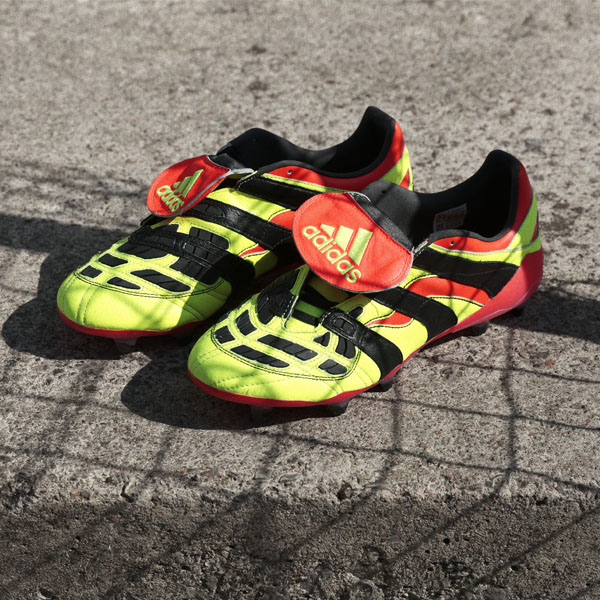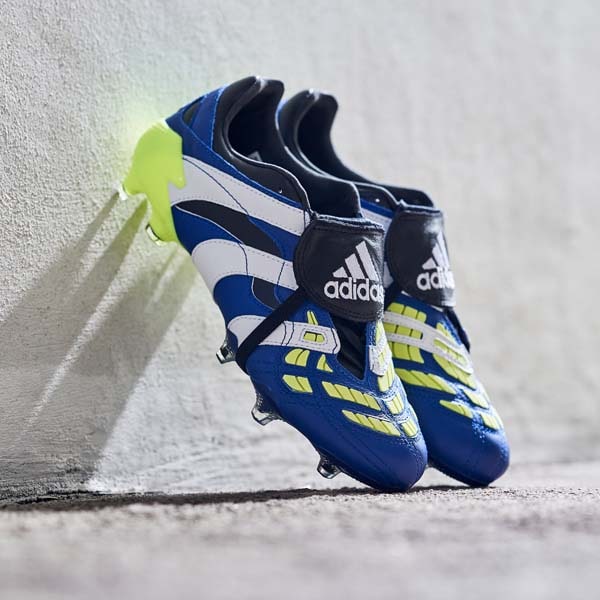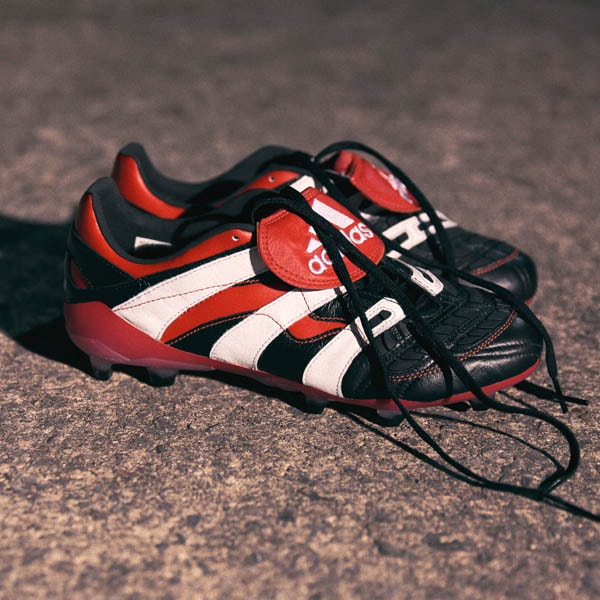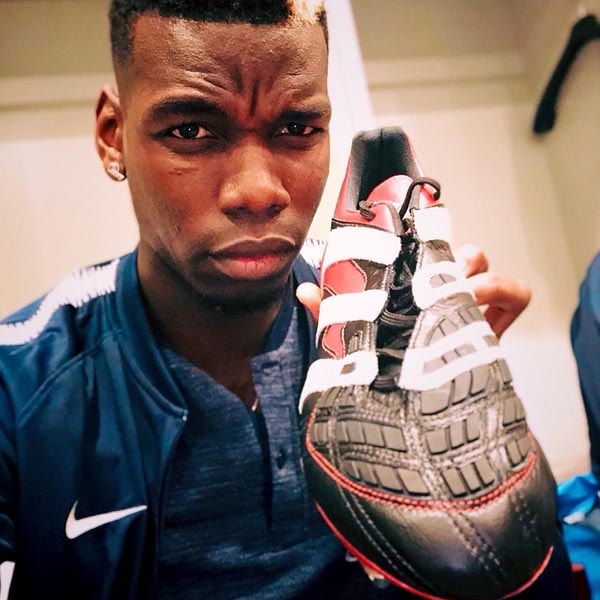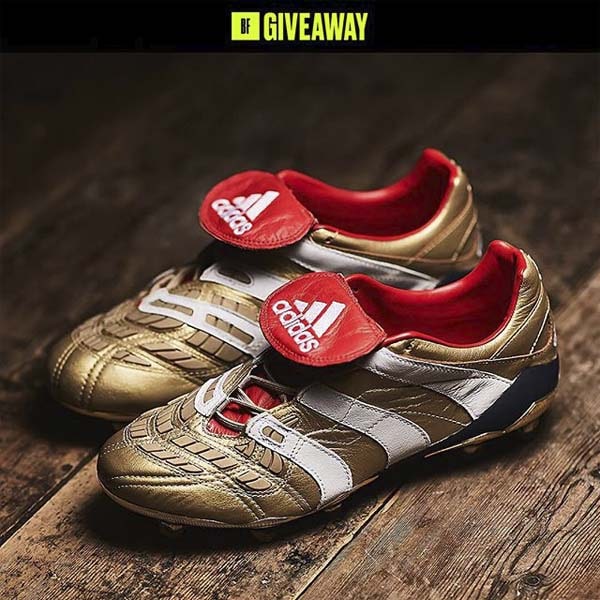France, 1998, and to coincide with the World Cup, adidas unleashed a new beast upon the world – one that would radically alter the course of boot design, define a generation and arguably never be bettered. That beast was the Predator Accelerator.
The adidas Predator Accelerator is hands down one of the greatest football boots of all time, and anyone that says otherwise is either too young to know better, is on some sort of mind-altering substance, or simply doesn’t know football. It was the boot that really established adidas’s market-leading position at a time when football culture was shifting lanes, fast. Think Accelerator, think Zidane, Beckham, France ’98, folded down tongues, curtains, and a new millennium right around the corner. It’s the quintessential piece for football at that time, heralding a new era, and no other boot can lay claim to that mantle in the same way. With it’s 25-year anniversary upon us, we take a look at just why it’s still the best adidas boot of all time.
In 1994, adidas reinvented its approach to football boot design with a revolutionary step, prioritising innovation above all else by adding rubber to the vamp – and it was a true game changer. But while the OG Predator may not have been the most visually pleasing creation ever, with its jagged edges and protruding parts, over the years it did what any great predator in the history of the world has done: it evolved.
The ongoing process saw the introduction of the iconic tongue with the Rapier in 1995 (an integral part of Predator design for the next 15 years) and that, in turn, morphed into the Touch in 1996, where red started to play a far more prominent role in the overall look. All positive improvements without a doubt, but it was the fourth generation that really hit the mark.
With a certain American brand starting to solidify its position in the football boot industry with the release of the R9 Mercurial heading into the 1998 World Cup, it was essential that adidas stamped its authority in the field. And they did that quite literally by refining the Predator to practical perfection with the Accelerator: a beautifully aggressive beast that has arguably never been bettered, both in terms of aesthetics and performance. That brand authority was further reinforced by Zinedine Zidane, poster boy for the new Accelerator, who went on to absolutely boss the World Cup final against Brazil in them. Quite the statement, if ever one was needed.

Adopted as the tools of their trade by some of the greatest players in the game, including the already mentioned Zidane, as well as the likes of Beckham, Del Piero and Kluivert, the Accelerator instantly made its mark both on the pitch and in the minds of millions of fans, ingraining itself as the absolute pinnacle of boot design.
On the feet of David Beckham in particular, it was seen as the ultimate advantage, seemingly assisting the United and England man to achieve nigh-on impossible precision (a glimpse at the future of the silo) and whip, as he curled free kicks into the top bins. But more than just its performance benefits, it was also seen as the boot of choice for arguably the first global superstar of football as he was coming into the peak of his powers, and it complemented the Beckham persona so perfectly: a little edgy, very sexy, and great on the pitch. Beckham and the Predator Accelerator felt like a marketing dream.
Aside from Zidane’s performances in France, Beckham was the talk of the nation up to and including that fateful flick out against Argentina, and yet even that moment was a spotlight on the Accelerator. And so it would go on as he played his part in Manchester United’s incredible treble in ’99, wielding the Accelerator like a wand to create moments of magic. The poster boy, the curtains, the pulled down tongue, the personalisation, the rebel… it all played into the narrative.

With two years to go until the millennium, it felt like the Accelerator was the football footwear of the future; a boot that at once defined an era and encapsulated a generation, whilst also setting the tone for the future of a silo that’s still going strong today, with the 25th anniversary right around the corner.
Refined rubber elements sewn into the leather, that fold over tongue, re-engineered TRX (traxion) outsole, asymmetrical lacing, a "feet you wear" insole… the Accelerator just had the lot, and it was all wrapped up in one of the most iconic aesthetics you’re ever likely to see: the perfect combination of black, white and red that has now become synonymous with the silo and which all fans crave for with any new release.
And then there were those stripes. Revamped, wavy, and weaved into the very tapestry that was the Accelerator’s visage, it was unlike anything adidas had ever put out into the world before. The Predator line had already played with the very essence of the brand’s identity through the OG’s unique Three Stripe design, carried across to the Rapier, but following the relatively tame Touch, the Accelerator took it to all-new extremes. These curvy new Three Stripes were representative of a brave new ethos, one that was at the heart of the Predator and the brand’s mindset at the time. While this Three Stripe execution has been homaged by the likes of the Sobakov trainer, and the Three Stripe branding itself has evolved along with the Predator over the years, the Accelerator look is so unique, so identifiable that it stands alone among the rest.

Even the name, Accelerator, is indicative of the rapid pace at which boot development would progress in the ensuing years – with the Predator always at the forefront, driving it on. The Accelerator took the already established concept of the Predator, and of boot design in general at the time, and leapt forward with it, propelling the brand, players and consumers alike into the future and the new century.

Placing the Accelerator above every other Predator that followed is not to write off the likes of the Mania, Pulse or Absolute (we all have our favourites, and what they are will speak volumes about you), but the Accelerator defined what is one of the biggest selling boot franchises of all time, firmly setting its course for the following decade, and it will always be the one by which all other Predators are measured.

Beyond the Predator line, it’s hard to argue against the longevity and impact of the Copa Mundial. This is a boot that’s truly stood the test of time, still being available on the market over four decades after its initial release with barely a change to that original design. That though, is why, for us, it falls short of the Accelerator. Its lack of change dilutes its impact, while the Accelerator really defined the game at such a crucial time, acting as the platform that adidas would build off for the next 25 years.

But look, if you’re firmly in the Copa camp, we’re not going to argue with you – that boot is an absolute classic, and its presence in the game for so many years should never be overlooked – the significance of the Accelerator in the history of boot design just edges it for us. It was so much more dynamic, arriving at a time when competition was seriously ramping up, both on and off the pitch, with Nike emerging as a real force in the game. And on the feet of Zidane, Beckham, Del Piero et al, it went on to not only define the brand’s approach to boot design for the next quarter of a century, it also helped redefine the game and create boot culture as we know it today.

25 years since its release, it’s still the boot to beat...
